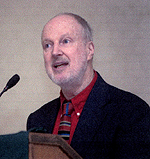Former CIA officer on uncertain future of “political Islam””
Graham Fuller: a mixed prognosis for U.S.-Muslim relations

Will relations between the United States and the Muslim world deteriorate to the point of a “clash of civilizations?”
Not necessarily, said Graham Fuller, former vice chairman of the CIA’s National Intelligence Council, in a lecture sponsored by the Center for International Relations on April 19 at BU’s School of Management — in fact, both sides can move away from confrontation. “It’s a question of how painful we — and they — choose to make the process,” he said.
Titled The Future of Political Islam, Fuller’s lecture drew on his 20 years in the Foreign Service and six years, from 1982 to 1988, at the CIA. A dark scenario can be averted, he said, if the United States and Muslim countries take several concrete steps, including the withdrawal of American troops from Iraq and Afghanistan. There must also be significant political reform in the Muslim world — supported actively by the United States — along with a just solution to the Israeli-Palestinian conflict.
A “political Islamist,” he said, is “anyone who believes that the Koran and the traditions of the Prophet have something important to say about Islamic governance and society and tries to implement it in some way.” That definition includes both radical and fundamentalist Muslims, as well as modernists who seek a contemporary interpretation of the Koran.
Pointing out the variety of Islam and its followers, Fuller is cautiously optimistic that the future of political Islam can be peaceful, provided that the United States abandons its “bold, simplistic, and brutal” backlash to the September 11 terrorist attacks and that there are regime changes in several Muslim countries. “Most Americans have little grasp of our role as a global superpower,” he said. “After the Cold War, we have had incalculable power,” fueling a feeling of impotence and anger in the Muslim world — a far cry from a thousand years ago, when the Muslim empire was the vanguard of civilization. “Muslims have to be able to control their own destiny,” he said.
With estimates that the war in Iraq ultimately could cost as much as $1 trillion, Fuller advocates “a wiser use of money now used for military purposes. Can you imagine if the United States spent even just a tenth of the cost of the war on building American universities and hospitals in the Middle East?”
Fuller most recently worked for the Rand Corporation, where his primary focus was on the Middle East, Central, South, and Southeast Asia, and ethnic problems in the former Soviet Union. His work for Rand included publications on Islamic fundamentalism in Turkey, Sudan, Afghanistan, Algeria, and Pakistan. In his lecture, as in his 2003 book, The Future of Political Islam, he presented two alternative futures: one in which there are increased tensions between Muslims and the West, and one in which relations improve and there is a more peaceful Middle East, along with an end to the U.S. war on terrorism. The latter, he said, depends on improved conditions in the developing world, especially the Muslim world, which would help reject sympathies for terrorism against the United States.
“I see a negative scenario if there are long-term U.S. military bases in Iraq, a fundamentalist takeover in Pakistan, if Palestine falls into total angry chaos, and if the United States continues to expand its footprint overseas,” he said.
Riding in a taxi in Pakistan years ago, Fuller said, he saw a bumper sticker on the inside of the door that read, “Fundamentalist and proud of it.” But, he pointed out, not all fundamentalists are bomb throwers. A minority of them are violent, but those get America’s attention.
“The question isn’t whether Islam will play a central role in politics,” he said, “but which Islam.”